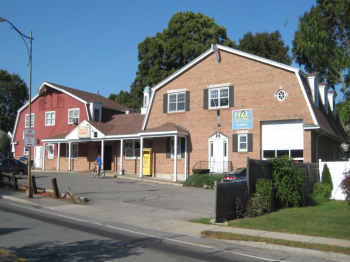Photo: The Zoning Board of Appeals voting to deny vote on hotel proposal.
For the second time this year, the Belmont Zoning Board of Appeals denied special permits which would have allowed the construction of a multimillion-dollar development on two lots at the intersection of Pleasant Street and Brighton Avenue.
This latest denial occurred Monday night, April 4, for the renovation of the two-building, two-story structure at 334 Pleasant St. – the former Mini Mart convenience store and offices – into a boutique hotel consisting of 19 guest rooms, a cafe for guests, a fitness room, a business center and offices on the 14,400 sq.-ft. site.

The ZBA Monday voted 3-2 not to even bring the five permits sought by Waltham developer Michael Columba before the board for discussion. Chair Eric Smith said the board did not have the authority to move the waivers forward since the town’s zoning bylaws don’t explicitly mention “hotels.” as an acceptable application.
“There is nothing in the bylaws that says a hotel can go anywhere in Belmont because there is no reference to a hotel use so how can we even hear arguments for the special permits,” said Smith.
The board dismissed the claim by Robert Levy, an attorney with Eckert Seamans Cherin & Mellott representing Columba, that the zoning bylaw’s parking requirements – which does briefly refers to a “hotel” – suggests the development’s “impacts” were similar to retail and service uses that are allowed at the site with a special permit.
“In my view, the mention of a hotel in the parking requirements was simply an error made at the time the bylaw was approved,” said Smith.
Not all the members held the same view as Smith as Associate Member John McManus said he “hates to see all these opportunities get squandered.”
While “disappoint,” Waltham developer Michael Columba said he was “OK” with the decision.
“I’ve always said that if the town did not want [a hotel], I have to put the building to good use with whatever tenants I can get,” Columba said, which will likely include a convenience store, garage and offices which are deemed “as of right” under the zoning bylaw and does not require town approval.
“I have to move on this project in a few months,” said Columba, who purchased the site in September 2015 for $1.9 million.
Monday’s decision follows the rejection on Jan. 11 of a proposed 3,500 sq.-ft. Dunkin’ Donut franchise and retail space across Brighton from Columba’s property. The landowners and franchise, the Leo family who operates nearly 20 donut shops in Massachusetts and Florida, has suggested appealing the 3-2 vote denying them permits to renovate a former gas station and garage it purchased for $1 million in 2014.
These latest board decisions have led some residents to complain that the ZBA is contributing to what many views as a negative business climate in Belmont, where the needs of commerce are pushed aside for those of residential housing.
Board members rejected the notion it is feeding the perception of an anti-business bias in town, saying it only follows what the Town Meeting – the legislative branch of town governance – has approved.
“In my view, we are trying to apply the bylaws which have been determined by Town Meeting what should be allowed and … if it turns out, in our opinion, it’s not, we are following [Town Meeting’s] edicts,” said Smith.
“This board definitely does not have an anti-business motivation,” said member Nicholas Iannuzzi, noting the ZBA approved “a ton of businesses along South Pleasant Street using the same bylaws which are on the books today.”
“But if something doesn’t fit within the zoning bylaws, then we don’t have much choice,” said Iannuzzi.
Changes to zoning laws would start at the Planning Board who would create a new bylaw before presenting it before Town Meeting for a vote. A current example is the rewriting of zoning language placing limits on the height and mass of new residential construction in the neighborhoods surrounding Grove Street playground.
But even if Town Meeting introduces hotel use under the bylaw, Columba is not interested in a do-over.
“No, I am not coming back for a hotel. That’s done. It’s no longer an option,” he said